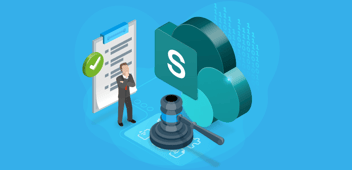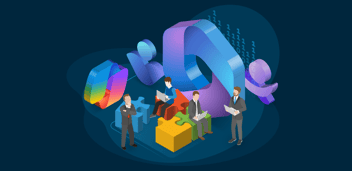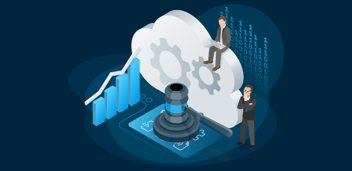At the very beginning of 2024, I wrote a blog article sharing my impressions about the future of cloud collaboration and what the year is expected to bring about in terms of new innovations and breakthroughs.
Half a year in, Microsoft has already conducted two major conferences – the first one being the Microsoft 365 Community Conference in Orlando and the second one, the Microsoft Build in Seattle. The two conferences were significant as Microsoft made several announcements regarding its product roadmap and innovations. Not surprisingly, a major portion of these announcements turned out to be centered around Copilot. These conferences underscored AI's crucial role in shaping the future of work and in no uncertain terms, communicated Microsoft’s priority as an organization.
Let's explore how these innovations have begun to shape the collaborative landscape and what the early outcomes tell us about the future of workplace collaboration.
Microsoft and AI
One of the most anticipated advancements for 2024 was the integration of AI, particularly the Copilot feature, into various Microsoft 365 applications. The vision of integrating AI into Microsoft 365 products is not just about adding new features; it’s about transforming how work is done. In an article by Behnam Tabrizi titled ‘How Microsoft Became Innovative Again’ published in the Harvard Business Review, the writer says that there was a time when observers of tech had written off Microsoft as ‘a 20th century phenomenon.’ What significantly changed in the past couple of years is the company’s partnership with OpenAI. The article goes on to attribute the tech giant’s adoption of a startup mindset to the strides the company is currently making.
No doubt that Copilot helps organizations be more productive and collaborate better, although early adoption wasn't completely devoid of uncertainties around the security and access concerns. Microsoft’s commitment to embedding AI within its ecosystem has not entirely begun to bear fruit – or at least to the degree Microsoft anticipated, with research studies reporting that organizations haven’t been able to see significant return on their investments. A Gartner study found that although generative AI is the most frequently deployed AI solution in many organizations, demonstrating the value of AI remains as a top barrier to adoption.
AI and the modern workplace today
The introduction of AI-powered tools like Copilot has fundamentally redefined the way organizations approach their daily tasks. Copilot and its capabilities are not just improving productivity—they're also changing the way employees engage with their tools, making work feel less mechanical and more human-centric.
The integration of AI tools like Copilot into daily workflows signals a broader shift towards more intelligent, adaptive workplaces. The nature of collaboration itself is changing. Traditional hierarchies and rigid systems are giving way to more fluid, dynamic forms of teamwork, where AI tools facilitate seamless communication and coordination across teams, regardless of geographical location. This leads to more inclusive workplaces, where diverse teams collaborate effectively without the constraints of time zones or the need for being physically present in the same office.
Employee engagement
According to a recent High Performing Organization Survey conducted by Microsoft Viva’s People Science team, one of the key factors that define high-performing organizations (HPOs) is employee engagement. This points to a paradigm shift of the traditional metrics of success, adding more human-centric factors along with financial performance metrics.
In the study, Microsoft pegs AI as one of the important ingredients to building high-performing organizations, suggesting that AI be used as an accelerant. The correlation between employee engagement and productivity and the organization's financial position has been studied.
Collaboration and security
Microsoft has now emphasized a shared responsibility model to AI risk assessment and mitigation and published a QuickStart Guide to Risk Assessment. The document drives home the idea that mitigation of AI risks is a shared responsibility between Microsoft and its customers. This QuickStart guide aims to assist organizations in performing a comprehensive risk assessment of Copilot for Microsoft 365.
As we move further into 2024 and beyond, the role of AI in the workplace will only become more pronounced. The developments we have seen so far are just the beginning of what promises to be a profound transformation in how we work. Companies that embrace these changes and actively integrate AI into their operations will likely find themselves at the forefront of their industries, leading with innovation and agility.
However, success in this new era will depend on more than just technology adoption. Organizations will need to foster a culture that embraces change and encourages continuous learning. Leaders will need to be both visionary and pragmatic, balancing the potential of AI with a clear understanding of its limitations and risks.
AI is not just shaping a new era of modern work; it is creating opportunities for a more efficient, collaborative, and dynamic workplace. The journey is just beginning, and those who are ready to innovate and adapt will find themselves well-positioned to thrive in the years to come.
Conclusion
As we navigate a new landscape in modern work, organizations must be willing to evolve their practices, re-adjust priorities, and consider new technologies. With the adoption of new tools to cater to the new definitions of productivity, organizations must have guard rails in place that help govern how end users collaborate securely and efficiently. A robust Microsoft governance approach should be in place from the get-go so that organizations can proactively address adoption, security and cost challenges.
At Rencore, our cloud collaboration governance tool Rencore Governance is built keeping in mind the unique challenges organizations of all sizes face when it comes to collaborating in the cloud.
If you have specific questions about AI governance, I recommend downloading our free whitepaper titled 'Regulating your AI companion: Best practices for Microsoft Copilot governance'.





